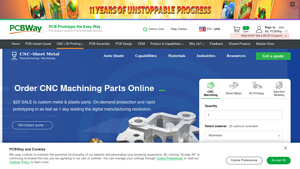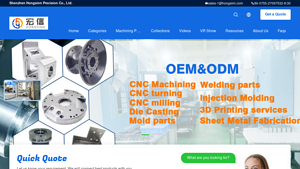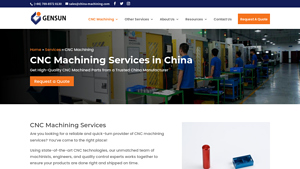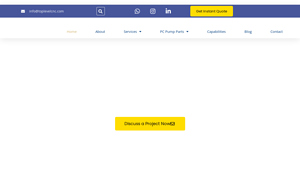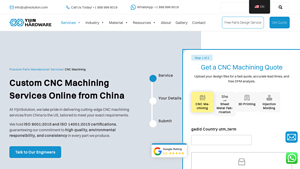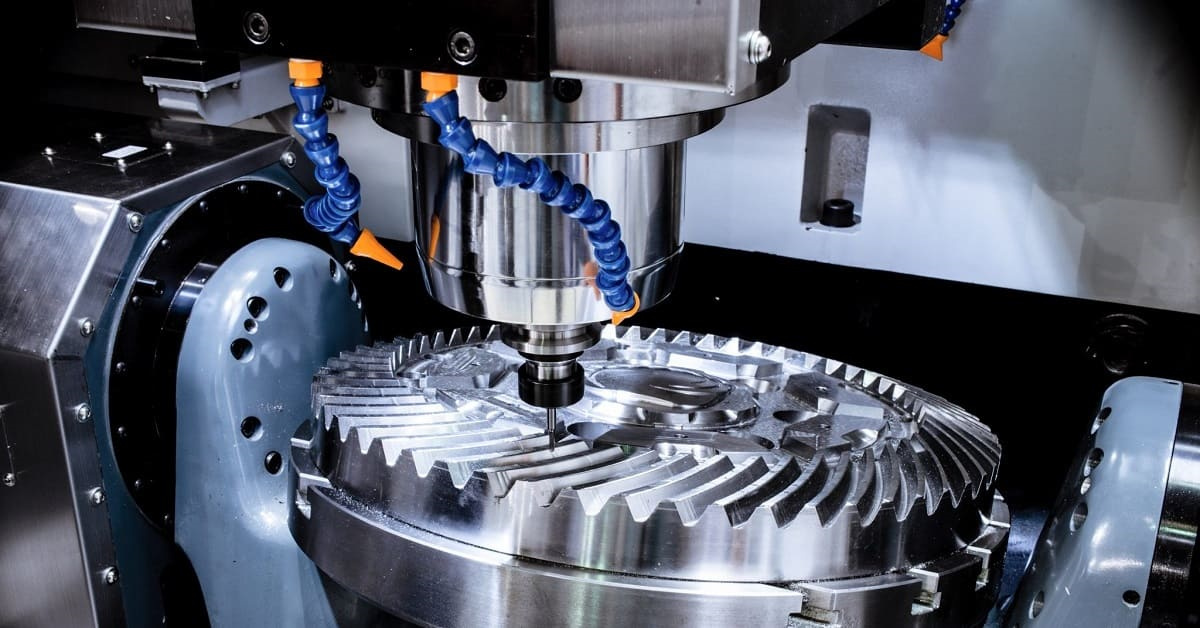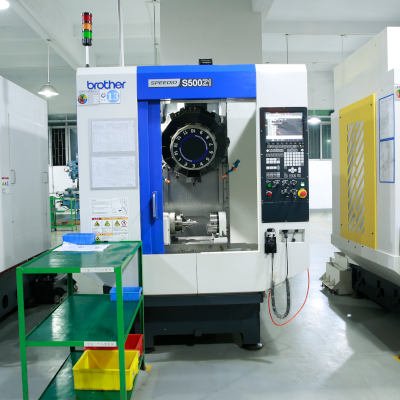Top 7 Cnc Machining Services China Manufacturers & Suppliers List
1. PCBWay – Precision CNC Machining & Prototyping Solutions
Domain: pcbway.com
Registered: 2012 (13 years)
Introduction: CNC Machining: 3-, 4-, and full 5-axis milling and turning; 3D Printing: SLA, SLS, FDM, DMLS, PolyJet; Sheet Metal Fabrication: laser cutting, bending, post-processing; Injection Molding: rapid tooling, multi-cavity molds; Materials: metals (aluminum, stainless steel, brass, copper, titanium, mild steel, alloy steel, tool steel, spring steel) and plastics (ABS, polycarbonate, nylon, polypropylene,…
2. Hongsinn – Custom CNC Machining Services
Domain: m.hongsinn.com
Registered: 2013 (12 years)
Introduction: Custom CNC Machining Service, Bespoke CNC Machining, 5 Axis CNC Machining, CNC Turning Parts, CNC Milling Parts, CNC Cutting Service, CNC Lathe Parts, CNC Machining Large Parts, CNC Aluminium Parts, CNC Steel Parts, Plastic CNC Machining Parts, Carbide Machining, CNC Machining Automation Parts, CNC Machining Aerospace Parts, CNC Machining Medical Parts, Precision Mold Parts, CNC Prototype Service,…
3. At Machining – CNC Machining Services
Domain: at-machining.com
Registered: 2014 (11 years)
Introduction: Top China CNC Machining Service, Quick, Accurate, Flexible, No MOQ. Services include CNC Machining, CNC Milling, CNC Turning, Precision 5-Axis CNC Machining, Swiss CNC Machining, Small Batch CNC Machining, Precision Micro Machining, Sheet Metal Fabrication, Surface Finishing Services (Anodizing, Electroplating, Powder Coating), Carburizing Heat Treatment, Wire EDM Machining. Materials offered: Met…
4. China Machining – CNC Machining Services
Domain: china-machining.com
Registered: 2008 (17 years)
Introduction: CNC Machining Services in China, high-quality CNC machined parts, ISO 9001:2015 certified facility, rapid prototyping, low-volume production, precision machined parts, broad range of materials (metals: aluminum, steel, stainless steel, brass, copper; plastics: POM, PTFE, PC, PEEK, PET; special alloys: Kovar, Invar, Inconel, Titanium, Mocu), tolerances as tight as ±0.001mm, CNC milling and turning …
5. Top Level Intl. – CNC Machining Services
Domain: toplevelcnc.com
Registered: 2013 (12 years)
Introduction: Top Level Intl. is a CNC machine shop in China specializing in CNC Machining Services, including custom machined parts and standard Progressive Cavity Pump Parts (PC Pump Parts). They offer a one-stop CNC Machining Solution that includes raw materials, CNC machining services, and required surface finishes. Their capabilities include CNC Turning, CNC Milling, Turn-Milling, 4-axis CNC machining, 5-a…
6. HLH Prototypes – CNC Machining Services
Domain: hlhprototypes.com
Registered: 2012 (13 years)
Introduction: CNC Machining Services at HLH Prototypes specialize in rapid prototyping using high-speed, high-precision CNC manufacturing. The services start with solid blocks or billets of material, which are precisely cut using various tools to form desired shapes. CNC machined parts conform to ISO 2678-1 International Tolerance legislation. HLH offers a wide range of materials including plastics and metals, …
7. Yijin Solution – CNC Machining Services
Domain: yijinsolution.com
Registered: 2019 (6 years)
Introduction: CNC Machining Service from China, offering custom parts online. Services include CNC Turning, CNC Milling, 5 Axis CNC Machining, Rapid CNC Machining, Small Batch and High-Volume CNC Machining, Swiss Machining, CNC Wood Routing, Sheet Metal Fabrication (Laser Cutting, Plasma Cutting, Metal Bending), Custom Fasteners, Die Casting, Impeller Pump Manufacturing, Rapid Prototyping, and Custom Plastic Pa…
Introduction: Navigating the Global Market for cnc machining services china
In today’s competitive landscape, sourcing CNC machining services from China poses significant challenges for international B2B buyers. With a myriad of suppliers offering various capabilities, understanding how to navigate this intricate market can be daunting. This guide delves deep into the world of CNC machining services in China, covering essential aspects such as types of machining available, applications across diverse industries, and effective supplier vetting strategies. By shedding light on the complexities of cost structures and quality assurance practices, we aim to empower buyers from regions like Africa, South America, the Middle East, and Europe—specifically in countries such as Brazil and Nigeria—to make informed purchasing decisions.
As you explore this comprehensive resource, you will gain actionable insights that demystify the process of engaging with Chinese CNC machining suppliers. This guide not only highlights the key considerations when selecting a partner but also provides practical tips for optimizing your procurement strategy. Whether you are in the automotive, aerospace, or consumer electronics sector, our detailed analysis will equip you with the knowledge necessary to enhance your sourcing process and ensure the delivery of high-quality components. Embrace the opportunity to streamline your operations and leverage the benefits of China’s robust manufacturing capabilities.
Understanding cnc machining services china Types and Variations
| Type Name | Key Distinguishing Features | Primary B2B Applications | Brief Pros & Cons for Buyers |
|---|---|---|---|
| CNC Milling | Multi-axis machining capabilities (3, 4, 5-axis) | Aerospace, Automotive, Electronics | Pros: High precision; versatile materials. Cons: Setup time can be lengthy. |
| CNC Turning | Rotational machining for cylindrical parts | Oil & Gas, Medical Devices, Automotive | Pros: Excellent for high-volume production. Cons: Limited to round shapes. |
| CNC Wire EDM | Electrical discharge machining for intricate designs | Aerospace, Electronics, Tooling | Pros: Exceptional detail; minimal material waste. Cons: Slower than traditional methods. |
| CNC Sheet Metal Fabrication | Laser cutting, bending, and welding for sheet metals | Construction, Automotive, Consumer Products | Pros: Cost-effective for large sheets; quick production. Cons: Less suitable for complex shapes. |
| 3D Printing | Layer-by-layer additive manufacturing | Prototyping, Custom Parts, Consumer Electronics | Pros: Fast prototyping; complex geometries possible. Cons: Limited material strength compared to traditional methods. |
What Are the Characteristics and Suitability of CNC Milling Services?
CNC milling is a highly versatile machining process that employs multi-axis capabilities to create complex shapes and designs. This service is particularly suitable for industries requiring high precision, such as aerospace and automotive sectors. B2B buyers should consider the material options available, as CNC milling can handle a wide range of materials, from metals to plastics. However, potential buyers must also be aware of the setup time, which can affect lead times for projects.
How Does CNC Turning Differ from Other Machining Services?
CNC turning specializes in creating cylindrical parts by rotating the material against a cutting tool. This method is ideal for high-volume production runs, particularly in industries such as oil and gas and medical devices. Buyers should evaluate the production capacity and turnaround times offered by suppliers, as well as the range of materials they can work with. While CNC turning offers efficiency and speed, it is limited to parts with rotational symmetry.
Why Choose CNC Wire EDM for Intricate Designs?
CNC Wire EDM (Electrical Discharge Machining) is renowned for its ability to create intricate and highly detailed components. This process is particularly effective for hard materials and is widely used in the aerospace and electronics industries. B2B buyers should consider the precision levels required for their projects, as Wire EDM delivers exceptional accuracy with minimal material loss. However, it may not be the fastest option, which could impact project timelines.
What Are the Benefits of CNC Sheet Metal Fabrication?
CNC sheet metal fabrication encompasses processes like laser cutting, bending, and welding, making it suitable for producing parts in industries such as construction and automotive. This service is particularly advantageous for large sheet production due to its cost-effectiveness and speed. Buyers should assess the capabilities of suppliers in terms of material handling and the complexity of shapes they can produce. However, this method may not be ideal for very intricate designs.
When to Consider 3D Printing for Custom Parts?
3D printing offers a unique approach to manufacturing by building parts layer by layer, making it an excellent choice for rapid prototyping and custom parts. It is particularly beneficial for industries like consumer electronics, where design flexibility is crucial. B2B buyers should weigh the advantages of quick turnaround times and the ability to create complex geometries against potential limitations in material strength. Understanding the specific requirements of their projects will help buyers make informed decisions.
Key Industrial Applications of cnc machining services china
| Industry/Sector | Specific Application of cnc machining services china | Value/Benefit for the Business | Key Sourcing Considerations for this Application |
|---|---|---|---|
| Automotive | Precision parts for engine components | Enhances vehicle performance and safety | Quality certifications, material specifications |
| Aerospace | Custom brackets and structural components | Ensures compliance with strict safety regulations | Tolerance levels, lead times, and material traceability |
| Medical Devices | Surgical instruments and implants | Critical for patient safety and operational efficiency | Biocompatibility, precision requirements, and certifications |
| Electronics | Housing and enclosures for consumer electronics | Improves product durability and aesthetics | Surface finish options, rapid prototyping capabilities |
| Industrial Machinery | Custom components for machinery and equipment | Increases operational efficiency and reduces downtime | Material selection, production scalability, and lead times |
How Are CNC Machining Services Used in the Automotive Industry?
In the automotive sector, CNC machining services from China are vital for producing precision parts such as engine components, transmission systems, and specialized tools. These parts must meet stringent performance and safety standards, which requires high precision and quality. International buyers should prioritize suppliers with ISO certifications and a proven track record of delivering reliable components, ensuring their vehicles operate efficiently and safely.
What Role Does CNC Machining Play in Aerospace Applications?
CNC machining services are crucial in the aerospace industry for manufacturing custom brackets, structural components, and intricate parts that require exceptional precision. The aerospace sector demands compliance with rigorous safety regulations, making it essential for suppliers to offer parts that meet specific tolerance levels and material certifications. Buyers should consider lead times and the supplier’s ability to provide traceable materials to guarantee the integrity of their components.
How Are CNC Machining Services Essential for Medical Devices?
In the medical device industry, CNC machining services are used to create surgical instruments and implants that require high precision and biocompatibility. The reliability of these components directly impacts patient safety and treatment outcomes. International buyers must ensure that their suppliers adhere to stringent quality standards and certifications, such as ISO 13485, to meet regulatory requirements and maintain operational efficiency.
What Benefits Do CNC Machining Services Provide for Electronics?
CNC machining services are instrumental in the electronics sector, particularly for producing durable housings and enclosures for consumer electronics. These components must not only be aesthetically pleasing but also provide protection for sensitive electronic parts. Buyers should seek suppliers who can offer a variety of surface finishes and rapid prototyping capabilities to accommodate design changes and expedite time-to-market.
How Do CNC Machining Services Enhance Industrial Machinery Production?
In industrial machinery, CNC machining services are employed to create custom components that enhance the efficiency and reliability of equipment. These components can be tailored to specific operational needs, reducing downtime and improving productivity. Buyers should focus on suppliers that offer a wide selection of materials and can scale production to meet varying demand levels, ensuring a steady supply of high-quality parts for their machinery.
3 Common User Pain Points for ‘cnc machining services china’ & Their Solutions
Scenario 1: Navigating Quality Control Challenges in CNC Machining
The Problem:
B2B buyers often face significant challenges with quality control when sourcing CNC machining services from China. These issues can stem from language barriers, cultural differences, and variations in manufacturing standards. For instance, a buyer may order precision parts only to find that they do not meet the specified tolerances or quality expectations upon delivery. This can lead to costly production delays, increased waste, and dissatisfaction with the supplier.
The Solution:
To mitigate quality control issues, B2B buyers should implement a robust pre-production phase. This involves setting clear specifications for tolerances, material properties, and surface finishes in the initial contract. Buyers should also request samples or prototypes before full production begins, allowing them to verify quality firsthand. Utilizing third-party quality assurance services can provide an additional layer of oversight, ensuring that the manufacturing process adheres to international standards. Engaging directly with the manufacturer through regular communication—preferably with a bilingual representative—can help clarify expectations and address concerns promptly, fostering a more collaborative relationship.
Scenario 2: Overcoming Communication Barriers in International Transactions
The Problem:
Communication barriers can pose a significant challenge for international buyers dealing with CNC machining services in China. Misunderstandings may arise due to language differences or varying interpretations of technical specifications. For example, a buyer may request a specific finish or material type, only to receive a product that does not align with their expectations due to miscommunication. This not only delays projects but can also lead to unexpected costs and project revisions.
The Solution:
To enhance communication and minimize misunderstandings, buyers should utilize detailed documentation throughout the procurement process. This includes providing clear drawings, specifications, and even photographs of desired products. Using standardized terminology and avoiding jargon can also help ensure clarity. Establishing a single point of contact within the manufacturing firm can streamline communication, making it easier to discuss technical details and address issues as they arise. Additionally, utilizing project management tools that allow for real-time updates and feedback can improve transparency and keep all parties aligned throughout the production process.
Scenario 3: Managing Lead Times and Delivery Expectations
The Problem:
International buyers often struggle with lead times and delivery schedules when sourcing CNC machining services from China. Lead times can be unpredictable, especially if the manufacturer is juggling multiple projects or facing supply chain disruptions. A buyer may plan their production schedule based on promised delivery dates, only to encounter delays that can ripple through their entire operation, affecting timelines and customer satisfaction.
The Solution:
To manage lead times effectively, buyers should prioritize suppliers who offer transparency in their production timelines. Requesting detailed production schedules and regular updates can help buyers stay informed about their order’s status. Additionally, incorporating buffer time into project timelines can provide a cushion for unexpected delays. Buyers should also consider building relationships with multiple suppliers to diversify their sourcing options, allowing for flexibility in case one supplier cannot meet deadlines. Finally, negotiating clear terms regarding penalties for missed deadlines can incentivize manufacturers to adhere to agreed-upon timelines, ensuring that production flows smoothly.
By addressing these common pain points proactively, B2B buyers can enhance their sourcing experience, ensuring that they receive high-quality CNC machined parts in a timely manner while fostering strong supplier relationships.
Strategic Material Selection Guide for cnc machining services china
When selecting materials for CNC machining services in China, international B2B buyers must consider various factors that influence the performance, cost, and suitability of the final products. Below is an analysis of four commonly used materials in CNC machining, highlighting their properties, advantages, disadvantages, and considerations for buyers from diverse regions such as Africa, South America, the Middle East, and Europe.
What are the Key Properties of Aluminum in CNC Machining?
Aluminum is a lightweight metal known for its excellent corrosion resistance and good thermal conductivity. It typically has a temperature rating up to 400°F (204°C) and can withstand moderate pressures. Its low density makes it ideal for applications where weight is a critical factor, such as in the aerospace and automotive industries.
Pros: Aluminum is durable, easy to machine, and relatively inexpensive compared to other metals. It also offers excellent surface finish options, which can enhance the aesthetic appeal of the final product.
Cons: While aluminum is strong, it may not be suitable for high-stress applications compared to steel. Additionally, it can be more expensive than some plastics, depending on the grade.
Impact on Application: Aluminum is compatible with various media, making it suitable for automotive parts, consumer electronics, and structural components.
Considerations for Buyers: Buyers should ensure compliance with relevant standards such as ASTM and ISO, particularly for aerospace or automotive applications. Understanding local preferences for material grades is crucial, as different regions may have specific requirements.
How Does Stainless Steel Perform in CNC Machining?
Stainless steel is renowned for its exceptional corrosion resistance, making it ideal for applications in harsh environments. It can withstand temperatures exceeding 1500°F (815°C) and is often used in food processing, medical devices, and marine applications.
Pros: Stainless steel is highly durable and offers excellent mechanical properties, including strength and toughness. It is also easy to clean, making it suitable for sanitary applications.
Cons: The machining process for stainless steel can be more complex and costly due to its hardness. It may also require specialized tooling, which can increase production times.
Impact on Application: Stainless steel is compatible with various chemicals and is often used in applications where hygiene is paramount, such as in the medical and food industries.
Considerations for Buyers: International buyers should verify compliance with relevant standards, such as ASTM A240 for stainless steel. Understanding local regulations regarding food safety or medical standards is essential for successful procurement.
What are the Advantages of Using Plastics in CNC Machining?
Plastics, such as ABS and POM, are widely used in CNC machining due to their lightweight nature and versatility. They typically have a temperature rating of up to 200°F (93°C) and offer good chemical resistance.
Pros: Plastics are cost-effective and easy to machine, allowing for rapid prototyping and production. They can be molded into complex shapes, making them suitable for intricate designs.
Cons: Plastics may not provide the same strength and durability as metals, limiting their use in high-stress applications. They can also be susceptible to UV degradation and temperature fluctuations.
Impact on Application: Plastics are commonly used in consumer products, automotive components, and electronic housings, where weight and cost are critical factors.
Considerations for Buyers: Buyers should consider local preferences for specific plastic grades and ensure compliance with environmental regulations, especially in regions with strict waste management policies.
What Makes Titanium a Unique Choice for CNC Machining?
Titanium is a high-performance metal known for its strength-to-weight ratio and corrosion resistance. It can withstand temperatures exceeding 1200°F (649°C) and is often used in aerospace, medical, and high-performance automotive applications.
Pros: Titanium is incredibly strong yet lightweight, making it ideal for applications where performance is critical. It also has excellent biocompatibility, making it suitable for medical implants.
Cons: The cost of titanium is significantly higher than other materials, and its machining can be challenging due to its hardness. This can lead to longer lead times and increased production costs.
Impact on Application: Titanium is compatible with various environments, making it suitable for aerospace components, medical devices, and high-performance automotive parts.
Considerations for Buyers: Buyers should ensure compliance with international standards such as ASTM F136 for medical-grade titanium. Understanding the specific requirements for aerospace or medical applications is vital for successful procurement.
Summary Table of Material Selection for CNC Machining Services in China
| Material | Typical Use Case for cnc machining services china | Key Advantage | Key Disadvantage/Limitation | Relative Cost (Low/Med/High) |
|---|---|---|---|---|
| Aluminum | Aerospace components, consumer electronics | Lightweight and corrosion-resistant | Less suitable for high-stress use | Medium |
| Stainless Steel | Medical devices, food processing equipment | High durability and strength | Complex machining process | High |
| Plastics | Consumer products, automotive components | Cost-effective and versatile | Less strength than metals | Low |
| Titanium | Aerospace, medical implants | High strength-to-weight ratio | Expensive and difficult to machine | High |
This strategic material selection guide provides international B2B buyers with a comprehensive overview of the most common materials used in CNC machining services in China, aiding in informed decision-making for their specific applications.
In-depth Look: Manufacturing Processes and Quality Assurance for cnc machining services china
What Are the Key Stages in the Manufacturing Process for CNC Machining Services in China?
The manufacturing process for CNC (Computer Numerical Control) machining services in China typically involves several critical stages that ensure precision and quality. Understanding these stages is vital for B2B buyers looking to source custom components effectively.
1. Material Preparation: How Are Raw Materials Selected and Processed?
Material preparation is the first step in CNC machining, where manufacturers select suitable materials based on the specific requirements of the project. Common materials include metals like aluminum, stainless steel, and brass, as well as plastics such as ABS and polycarbonate. The chosen material undergoes initial processing, which may involve cutting it to size and ensuring it meets the specifications required for the machining process.
2. Forming: What Techniques Are Used in CNC Machining?
The forming stage is where the actual machining occurs. This process includes several key techniques:
-
CNC Milling: This involves using rotating cutters to remove material from a workpiece, allowing for complex shapes and designs. Both 3-axis and advanced 5-axis milling machines are commonly used.
-
CNC Turning: In this process, the workpiece is rotated while a stationary cutting tool removes material. This technique is particularly useful for creating cylindrical parts.
-
3D Printing: Increasingly, CNC machining services are integrating 3D printing techniques, such as SLA (Stereolithography) and SLS (Selective Laser Sintering), to produce prototypes and complex geometries.
Each technique is chosen based on the desired part specifications, tolerances, and production volumes.
3. Assembly: How Are Components Joined Together?
For projects requiring multiple parts, the assembly stage is crucial. This may involve various methods, such as:
-
Mechanical Assembly: Using screws, bolts, or other fasteners to join parts together.
-
Welding: For metal components, welding can provide strong, permanent joints.
-
Adhesive Bonding: In some cases, especially with plastics, adhesives may be used to bond components.
The assembly process is carefully monitored to ensure that all parts fit together correctly and meet the specified tolerances.
4. Finishing: What Surface Treatments Are Applied?
Finishing processes enhance the appearance and functionality of the machined parts. Common finishing techniques include:
-
Anodizing: This electrochemical process increases corrosion resistance and surface hardness for aluminum parts.
-
Painting and Coating: Various coatings can be applied for aesthetic purposes or to enhance durability.
-
Polishing and Sanding: These processes improve the surface finish and can help meet specific aesthetic requirements.
What Quality Control Measures Are Implemented in CNC Machining Services?
Quality assurance is critical in CNC machining to ensure that products meet international standards and client specifications. B2B buyers should be aware of the various quality control measures in place.
1. What International Standards Are Relevant for CNC Machining?
CNC machining services in China often adhere to international quality standards, such as:
-
ISO 9001: This standard outlines requirements for a quality management system, ensuring consistent quality in products and services.
-
CE Marking: Essential for products sold in the European market, indicating compliance with health, safety, and environmental protection standards.
-
API Certification: Relevant for manufacturers in industries like oil and gas, indicating compliance with specific industry standards.
Understanding these standards helps B2B buyers assess the reliability of suppliers.
2. What Are the Key Quality Control Checkpoints?
Quality control in CNC machining typically involves several checkpoints:
-
Incoming Quality Control (IQC): This initial inspection checks raw materials for defects before production begins.
-
In-Process Quality Control (IPQC): Throughout the manufacturing process, inspections are performed to ensure that parts meet specified tolerances and quality standards.
-
Final Quality Control (FQC): After production, a thorough inspection is conducted to verify that the finished products meet all requirements before they are shipped.
3. What Common Testing Methods Are Used?
Various testing methods are employed to verify the quality of CNC machined parts, including:
-
Dimensional Inspection: Using calipers, micrometers, and coordinate measuring machines (CMM) to ensure parts meet specified dimensions.
-
Surface Roughness Testing: Assessing the smoothness of the part’s surface to ensure it meets required specifications.
-
Functional Testing: Conducting tests to ensure that parts perform as intended in their final applications.
How Can B2B Buyers Verify Supplier Quality Control?
For international buyers, verifying the quality control processes of CNC machining suppliers is crucial. Here are some actionable steps:
1. Conduct Supplier Audits
Performing on-site audits allows buyers to assess the manufacturing capabilities, quality control measures, and overall operational practices of potential suppliers. This hands-on approach provides insight into the supplier’s commitment to quality.
2. Request Quality Assurance Reports
Buyers should request detailed quality assurance reports that outline the results of IQC, IPQC, and FQC processes. These documents provide transparency and assurance regarding the quality of the products being sourced.
3. Utilize Third-Party Inspection Services
Engaging third-party inspection services can offer an unbiased assessment of the supplier’s quality control processes and the final products. This is particularly important for buyers from regions like Africa and South America, where logistics and quality assurance may pose challenges.
What Are the Quality Control Nuances for International Buyers?
B2B buyers, especially from regions like Africa, South America, the Middle East, and Europe, should be aware of specific nuances when it comes to quality control in CNC machining:
-
Cultural Differences: Understanding cultural attitudes towards quality and customer service can help buyers communicate effectively with suppliers.
-
Regulatory Compliance: Different regions may have unique regulatory requirements. Buyers must ensure that their suppliers are compliant with both local and international regulations.
-
Logistics and Delivery: The ability to track and ensure the quality of products during shipping is essential. Buyers should discuss logistics with suppliers to ensure proper handling and delivery.
By understanding the manufacturing processes and quality assurance measures in CNC machining services in China, B2B buyers can make informed decisions, ensuring that they receive high-quality, reliable products tailored to their specific needs.
Practical Sourcing Guide: A Step-by-Step Checklist for ‘cnc machining services china’
To assist B2B buyers in procuring CNC machining services from China, this guide provides a practical checklist of actionable steps. By following these steps, buyers can ensure they select the right supplier, manage their projects effectively, and achieve high-quality results.
Step 1: Define Your Technical Specifications
Clearly outlining your technical requirements is essential for successful sourcing. Specify dimensions, tolerances, materials, and any surface finishes required for your project. This clarity will help suppliers provide accurate quotes and avoid miscommunication later in the process.
Step 2: Research and Identify Potential Suppliers
Conduct thorough research to compile a list of potential CNC machining service providers in China. Look for companies with strong online presence, positive reviews, and industry certifications. Utilize platforms like Alibaba, Made-in-China, or industry-specific directories to find reputable suppliers.
Step 3: Evaluate Supplier Capabilities and Experience
Before committing, it’s crucial to vet suppliers thoroughly. Request company profiles, case studies, and references from buyers in a similar industry or region. Assess their machinery capabilities, technology used (e.g., 3-, 4-, or 5-axis machining), and experience with projects similar to yours.
- Key Considerations:
- Years in business and customer feedback.
- Range of materials they can work with (e.g., metals, plastics).
- Quality assurance processes in place.
Step 4: Verify Supplier Certifications and Compliance
Ensure that your chosen suppliers have the necessary certifications, such as ISO 9001 for quality management. This step is vital for ensuring that the supplier adheres to international quality standards, which can significantly impact the final product’s reliability and performance.
- Important Certifications:
- ISO 9001 or similar quality management certifications.
- RoHS compliance if applicable, particularly for electronic parts.
Step 5: Request Quotes and Compare Pricing
Once you have a shortlist of suppliers, request detailed quotes based on your specifications. Ensure that quotes include all costs, such as tooling, labor, and shipping. Comparing quotes will help you understand the market rates and choose a supplier that offers the best value for your requirements.
- What to Look For:
- Breakdown of costs for transparency.
- Lead times and payment terms.
- Any additional services like assembly or finishing.
Step 6: Conduct a Factory Visit or Virtual Tour
If possible, arrange a visit to the supplier’s facility or request a virtual tour. This step allows you to assess their operational capabilities firsthand and verify their equipment, workforce, and production processes. It also fosters a better relationship with the supplier.
Step 7: Establish Clear Communication Channels
Once you’ve selected a supplier, ensure that you establish clear communication channels. Regular updates on production status, potential issues, and timelines are essential for maintaining project momentum. Utilize tools like email, project management software, or direct messaging platforms to facilitate effective communication.
By following this step-by-step checklist, B2B buyers can navigate the complexities of sourcing CNC machining services from China, ensuring a smooth procurement process and high-quality outputs.
Comprehensive Cost and Pricing Analysis for cnc machining services china Sourcing
What are the Key Cost Components in CNC Machining Services from China?
Understanding the cost structure of CNC machining services in China is essential for international B2B buyers. The primary components influencing the total cost include:
-
Materials: The choice of materials significantly affects pricing. Common options such as aluminum, stainless steel, and plastics can have varying costs based on market demand and availability. Premium materials like titanium or specialized plastics will increase costs.
-
Labor: Labor costs in China are generally lower than in Western countries, but skilled labor for CNC machining can still influence pricing. The complexity of the machining process and the skill level required for precision work can impact labor costs.
-
Manufacturing Overhead: This encompasses expenses related to factory operations, including utilities, maintenance, and equipment depreciation. Efficient production processes can minimize overhead costs, making it crucial to choose a supplier with optimized operations.
-
Tooling: Tooling costs include the production and maintenance of the tools used for machining. Custom tooling can lead to higher upfront costs but may be necessary for specialized parts. Buyers should inquire about tooling costs and consider them in the total project budget.
-
Quality Control (QC): Ensuring that parts meet quality standards is vital, especially for industries like aerospace and automotive. The cost of QC processes, including inspections and certifications, should be factored into the overall pricing.
-
Logistics: Shipping costs can vary based on the destination, shipping method, and volume. Incoterms can also influence logistics expenses, as they define responsibilities for shipping, insurance, and tariffs.
-
Margin: Suppliers will typically include a profit margin in their pricing. Understanding the average margins in the industry can help buyers evaluate whether a quote is competitive.
How Do Price Influencers Affect CNC Machining Costs?
Several factors can influence the pricing of CNC machining services, making it essential for buyers to consider these elements when sourcing:
-
Volume/MOQ: Larger orders often lead to lower per-unit costs due to economies of scale. Buyers should negotiate minimum order quantities (MOQ) to maximize cost efficiency.
-
Specifications and Customization: The complexity of the parts required, including tolerances and finishes, can significantly impact costs. Custom designs may necessitate additional tooling or longer lead times, affecting pricing.
-
Material Selection: The choice of material not only affects the base cost but also influences machining time and tooling wear. Buyers should evaluate material specifications against their budget.
-
Quality and Certifications: Parts requiring specific certifications (e.g., ISO, RoHS) may incur additional costs. Buyers should ensure that suppliers can meet these quality standards without excessive markups.
-
Supplier Factors: The reputation and capabilities of the supplier can impact pricing. Established suppliers with advanced technology may charge more but offer superior quality and reliability.
-
Incoterms: Understanding Incoterms is crucial for international buyers, as they define the responsibilities for shipping costs and risks. This can significantly influence the total cost of ownership.
What Are the Best Tips for Negotiating CNC Machining Prices?
For B2B buyers, especially those from Africa, South America, the Middle East, and Europe, negotiating effectively can lead to significant savings:
-
Conduct Market Research: Understanding the average prices for CNC machining services in China can provide a benchmark for negotiations. This includes familiarizing yourself with material costs and labor rates.
-
Evaluate Total Cost of Ownership: Consider not just the upfront costs but also long-term expenses, including maintenance, shipping, and potential delays. This holistic view can guide more informed purchasing decisions.
-
Leverage Volume Discounts: If your business has consistent machining needs, negotiating for bulk pricing can yield significant savings. Discuss potential long-term partnerships with suppliers to secure better rates.
-
Request Multiple Quotes: Don’t settle for the first quote. Obtaining multiple quotes allows for comparison and can provide leverage in negotiations.
-
Be Transparent About Requirements: Clear communication about your needs can help suppliers provide more accurate quotes and avoid unexpected costs later in the process.
Conclusion
Navigating the cost structure and pricing landscape of CNC machining services in China requires careful consideration of various components and influencers. By understanding these elements, international B2B buyers can make informed decisions, negotiate effectively, and ultimately achieve cost savings while ensuring quality and reliability in their sourcing efforts. Always remember that prices can vary widely based on specific requirements, and it is prudent to request indicative quotes tailored to your unique project needs.
Alternatives Analysis: Comparing cnc machining services china With Other Solutions
Introduction to Alternative Solutions for CNC Machining
When considering CNC machining services from China, it’s essential for international B2B buyers to evaluate alternative solutions that may better fit their specific needs. This analysis will highlight two viable alternatives to CNC machining: 3D printing and traditional machining methods. Each option offers unique advantages and challenges, making it crucial to understand their comparative benefits in the context of performance, cost, implementation, maintenance, and ideal use cases.
Comparison Table
| Comparison Aspect | CNC Machining Services China | 3D Printing | Traditional Machining |
|---|---|---|---|
| Performance | High precision, complex parts | Good for prototypes, less precision | Very high precision, large volumes |
| Cost | Competitive, especially for large runs | Generally lower for small batches | Higher setup costs, lower for large runs |
| Ease of Implementation | Requires skilled operators, but streamlined | User-friendly software, minimal setup | Requires specialized machinery and skilled labor |
| Maintenance | Moderate, needs regular upkeep | Low, mainly software updates | High, machinery requires constant maintenance |
| Best Use Case | High-precision parts, complex geometries | Prototyping, low-volume production | High-volume production, durable parts |
Detailed Breakdown of Alternatives
3D Printing: What Are Its Advantages and Disadvantages?
3D printing has emerged as a strong alternative to CNC machining, particularly for prototyping and small batch productions. Its primary advantage lies in its ability to create complex geometries that may be difficult or impossible to achieve with traditional methods. Additionally, 3D printing can be more cost-effective for low-volume runs, as it reduces material waste and tooling costs. However, the precision of 3D printed parts may not match that of CNC machined components, making it less suitable for applications requiring high tolerances. Furthermore, the range of materials available for 3D printing is still limited compared to CNC machining.
Traditional Machining: When Is It the Best Choice?
Traditional machining encompasses various methods, including turning, milling, and drilling, often used for high-volume production. Its main strength lies in the ability to produce highly durable parts with exceptional precision, making it ideal for industries such as aerospace and automotive. However, the initial setup costs and time can be significant, especially when creating custom tooling. Moreover, traditional machining requires skilled operators and can involve lengthy lead times. Therefore, while it excels in high-volume scenarios, it may not be the best choice for rapid prototyping or low-volume production runs.
Conclusion: How to Choose the Right Solution for Your Needs
In selecting the appropriate manufacturing solution, B2B buyers should carefully evaluate their specific requirements, including production volume, desired precision, and budget constraints. CNC machining services from China stand out for high precision and complex geometries, making them ideal for detailed components. Conversely, 3D printing offers flexibility and cost savings for prototyping and small runs, while traditional machining excels in high-volume production where durability and precision are paramount. By assessing these factors, buyers can make informed decisions that align with their operational goals and project specifications.
Essential Technical Properties and Trade Terminology for cnc machining services china
What Are the Key Technical Properties in CNC Machining Services?
In the realm of CNC machining services in China, understanding the essential technical properties is crucial for international B2B buyers to ensure they receive high-quality parts that meet their specifications. Here are some key specifications that play a vital role in the machining process:
1. Material Grade
Material grade refers to the specific classification of materials used in CNC machining, such as aluminum, stainless steel, or titanium. Each grade has distinct physical and mechanical properties, which can affect the part’s strength, weight, and corrosion resistance. For buyers, selecting the right material grade is vital for ensuring the end product meets industry standards and application requirements.
2. Tolerance
Tolerance defines the permissible limits of variation in a part’s dimensions. In CNC machining, tolerances can range from ±0.05 mm to ±0.2 mm, depending on the complexity and precision required. Tight tolerances are crucial for applications in industries such as aerospace and medical devices, where even minor deviations can lead to product failure. Understanding tolerances helps buyers specify their needs clearly and avoid costly rework or rejects.
3. Surface Finish
Surface finish refers to the texture and smoothness of a part’s surface after machining. Common finishes include anodized, brushed, and bead-blasted. The choice of surface finish can affect not only the aesthetic quality of the part but also its performance in terms of wear resistance and friction. Buyers must consider the surface finish to align with the functional requirements of their products.
4. Lead Time
Lead time is the amount of time required from the placement of an order to the delivery of the finished product. In the CNC machining industry, lead times can vary widely based on the complexity of the part and the manufacturer’s capacity. Understanding lead times is essential for B2B buyers to manage their supply chain effectively and meet project deadlines.
5. Quantity
The quantity of parts ordered can significantly impact pricing and production scheduling. Manufacturers often have minimum order quantities (MOQ) to ensure efficient production runs. Buyers should be aware of MOQs when planning their projects to avoid unexpected costs and delays.
What Are Common Trade Terms in CNC Machining Services?
Navigating the landscape of CNC machining requires familiarity with industry jargon. Here are some common terms that international buyers should understand:
1. OEM (Original Equipment Manufacturer)
OEM refers to a company that produces parts or equipment that may be marketed by another company. In CNC machining, this term signifies that the manufacturer will create components that meet the specifications set by the client, often resulting in custom solutions tailored to specific needs.
2. MOQ (Minimum Order Quantity)
MOQ is the smallest number of units that a supplier is willing to sell. This term is crucial for buyers to understand as it impacts cost-effectiveness and production efficiency. Knowing the MOQ helps buyers make informed decisions about ordering and inventory management.
3. RFQ (Request for Quotation)
An RFQ is a document that buyers send to suppliers to request pricing and terms for specific products or services. It typically includes detailed specifications, quantities, and timelines. Crafting a thorough RFQ ensures that buyers receive accurate and competitive quotes, facilitating better negotiations.
4. Incoterms (International Commercial Terms)
Incoterms are a set of international rules that define the responsibilities of buyers and sellers in international transactions. They clarify who is responsible for shipping, insurance, and tariffs, which is essential for B2B transactions that involve cross-border shipping. Familiarity with Incoterms can help buyers avoid misunderstandings and disputes.
5. CAD (Computer-Aided Design)
CAD refers to the use of computer software to create precise drawings and technical illustrations. In CNC machining, CAD files are essential for producing parts as they provide the necessary specifications for the machining process. Buyers should ensure their designs are compatible with the manufacturer’s CAD capabilities to avoid production delays.
Conclusion
Understanding the essential technical properties and common trade terminology in CNC machining services can significantly enhance the decision-making process for international B2B buyers. By grasping these concepts, buyers can ensure they select the right manufacturing partner and achieve their project goals effectively.
Navigating Market Dynamics and Sourcing Trends in the cnc machining services china Sector
What Are the Key Trends Shaping the CNC Machining Services Market in China?
The CNC machining services sector in China is witnessing a transformative phase driven by several global factors. First, the increasing demand for customized and precision-engineered components across various industries, including automotive, aerospace, and consumer electronics, is propelling market growth. International B2B buyers, particularly from regions like Africa, South America, the Middle East, and Europe, are increasingly seeking reliable suppliers that can deliver high-quality parts swiftly. This demand is further amplified by the rise of Industry 4.0, which integrates smart manufacturing technologies, enabling real-time data sharing and process optimization.
Emerging trends such as automation and the Internet of Things (IoT) are reshaping sourcing strategies. Companies are leveraging advanced CNC machining technologies, including 5-axis machining and rapid prototyping, to enhance production efficiency and reduce lead times. Additionally, the rise of e-commerce platforms for B2B transactions is simplifying the sourcing process, allowing buyers to obtain instant quotes and track their orders online. This digital transformation is essential for international buyers aiming to streamline their supply chain management and mitigate risks associated with traditional sourcing methods.
How Important Is Sustainability and Ethical Sourcing in CNC Machining Services?
Sustainability and ethical sourcing have become critical considerations for international buyers looking to engage with CNC machining services in China. The environmental impact of manufacturing processes is under increasing scrutiny, pushing companies to adopt greener practices. For instance, many manufacturers are now utilizing eco-friendly materials and implementing energy-efficient production methods, which not only reduce carbon footprints but also appeal to environmentally conscious buyers.
Moreover, certifications like ISO 14001 and adherence to RoHS (Restriction of Hazardous Substances) regulations are becoming essential for suppliers aiming to demonstrate their commitment to sustainable practices. These certifications assure buyers that the products they source meet stringent environmental standards. Additionally, the demand for recycled materials in CNC machining is on the rise, driven by the need for sustainable production and waste reduction. For B2B buyers, partnering with suppliers that prioritize sustainability can enhance their brand reputation and align with corporate social responsibility goals.
What Is the Historical Context Behind CNC Machining Services in China?
The evolution of CNC machining services in China can be traced back to the late 20th century when the country began to modernize its manufacturing capabilities. Initially, Chinese manufacturers focused on low-cost production to cater to global demand, primarily for mass-produced components. However, as technology advanced, there was a significant shift towards precision machining and automation.
By the early 2000s, China’s CNC machining industry had started to adopt advanced technologies, making it a formidable player on the global stage. This transition has been characterized by increased investment in research and development, enabling manufacturers to offer high-quality and customized solutions. Today, China stands as a leading hub for CNC machining services, attracting international B2B buyers with its competitive pricing, vast capabilities, and commitment to quality. This historical context underscores the importance of understanding the sector’s evolution for making informed sourcing decisions in the present market landscape.
Frequently Asked Questions (FAQs) for B2B Buyers of cnc machining services china
-
1. How do I ensure quality control when sourcing CNC machining services from China?
To ensure quality control, start by verifying the certifications of potential suppliers, such as ISO 9001. Request samples of previous work to assess craftsmanship and precision. Additionally, inquire about their quality assurance processes, including testing methods and compliance with industry standards. Consider visiting the facility if possible or hiring a third-party inspection service to conduct on-site evaluations before placing large orders. Establishing clear communication regarding your specifications and expectations will also help maintain quality throughout the production process. -
2. What are the typical lead times for CNC machining services in China?
Lead times can vary significantly based on the complexity of the project, materials used, and the supplier’s workload. Generally, standard lead times for CNC machining can range from 3 to 15 business days. For prototype orders, expect quicker turnarounds, often within 2-5 days. Always confirm lead times during the quoting process and consider potential delays, especially during peak seasons or public holidays in China. Building a relationship with your supplier can also enhance their ability to accommodate urgent requests. -
3. What customization options are available for CNC machined parts?
Most CNC machining services offer extensive customization options, including material selection, part dimensions, surface finishes, and tolerances. Common materials include metals like aluminum and stainless steel, as well as plastics like nylon and polycarbonate. You can also specify custom features such as threads, holes, and complex geometries. Discuss your specific requirements with the supplier to ensure they can accommodate your design needs and provide recommendations for optimal manufacturing methods. -
4. What is the minimum order quantity (MOQ) for CNC machining services in China?
Minimum order quantities for CNC machining services can vary widely among suppliers, often ranging from a single prototype to several hundred units for production runs. Some companies specialize in low-volume orders, while others may require larger quantities to justify setup costs. When selecting a supplier, clarify their MOQ policies to ensure they align with your project needs. If you anticipate ongoing orders, negotiating lower MOQs may be possible based on future commitments. -
5. How can I vet suppliers for CNC machining services in China?
Vetting suppliers involves several steps: start by researching their company history, reputation, and customer reviews. Request references from previous clients and assess their experience in your specific industry. Verify certifications and compliance with international standards. Additionally, consider using platforms that provide supplier ratings and background checks. If feasible, visiting the facility can provide valuable insights into their operations and capabilities. Establishing clear communication and responsiveness during initial interactions can also indicate their professionalism. -
6. What payment terms should I expect when sourcing from Chinese CNC machining services?
Payment terms can vary by supplier, but common practices include a deposit (typically 30-50%) upfront with the balance due before shipping. Some suppliers may offer credit terms for established relationships. It’s essential to discuss and agree on payment methods (such as wire transfer, PayPal, or letters of credit) during negotiations. Ensure that the terms are documented in the contract to avoid misunderstandings later. Be cautious of overly favorable terms, as they might indicate a lack of stability. -
7. How do logistics and shipping work when ordering CNC machined parts from China?
Logistics typically involve choosing between air freight and sea freight, depending on your budget and urgency. Air freight is faster but more expensive, while sea freight is cost-effective for larger shipments. Most suppliers can assist with logistics arrangements, including customs clearance and documentation. Ensure you understand shipping costs, estimated delivery times, and who will handle customs duties upon arrival. Collaborating with a freight forwarder can streamline the process and help you navigate international shipping regulations. -
8. What industries commonly utilize CNC machining services from China?
CNC machining services are widely used across various industries, including automotive, aerospace, electronics, medical devices, and consumer goods. The precision and versatility of CNC machining make it ideal for producing components that require high tolerances and complex geometries. Many companies turn to Chinese suppliers for competitive pricing and rapid prototyping capabilities. Understanding the specific applications and requirements of your industry can help you select the right supplier with relevant experience and expertise.
Important Disclaimer & Terms of Use
⚠️ Important Disclaimer
The information provided in this guide, including content regarding manufacturers, technical specifications, and market analysis, is for informational and educational purposes only. It does not constitute professional procurement advice, financial advice, or legal advice.
While we have made every effort to ensure the accuracy and timeliness of the information, we are not responsible for any errors, omissions, or outdated information. Market conditions, company details, and technical standards are subject to change.
B2B buyers must conduct their own independent and thorough due diligence before making any purchasing decisions. This includes contacting suppliers directly, verifying certifications, requesting samples, and seeking professional consultation. The risk of relying on any information in this guide is borne solely by the reader.
Strategic Sourcing Conclusion and Outlook for cnc machining services china
In conclusion, the landscape of CNC machining services in China presents a wealth of opportunities for international B2B buyers. Key takeaways highlight the advantages of leveraging China’s advanced manufacturing capabilities, cost-effectiveness, and rapid prototyping services. Strategic sourcing from reputable Chinese suppliers can significantly enhance product development timelines while ensuring high-quality standards.
As industries across Africa, South America, the Middle East, and Europe seek to optimize their supply chains, establishing partnerships with reliable CNC machining providers can lead to sustainable competitive advantages. Buyers are encouraged to conduct thorough research, utilize online platforms for instant quotes, and prioritize suppliers who demonstrate strong customer service and quality assurance protocols.
Looking ahead, the continued evolution of technology and manufacturing processes in China will likely further enhance the capabilities of CNC machining services. This presents a unique opportunity for businesses to innovate and adapt to changing market demands. Embrace these advancements and consider reaching out to potential partners today to unlock the benefits of strategic sourcing in your operations.
